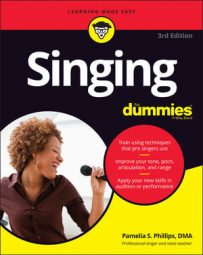Yes, variety is the spice of life, and your choice of songs should offer variety. A little variety gives you an opportunity to show off a well-balanced set of skills. Song number one can be a song that shows off glorious high notes, and song number two may have a sassy belt that shows off your ability to change gears quickly.
Find songs that show off your strengths as a singer, and try to find variety within each song. The biggest pitfall to avoid is choosing only songs that develop the same kind of character (or same personality) and showcase the same kind of vocal sound.
If you show only one side of you, the auditioner can’t see that you’re a skilled performer who can sing different kinds of songs and can add variety and spice throughout the show.
The following list offers ways to show versatility at specific types of auditions:
Opera: When you know your voice type and fach, choose a variety of arias based on language and characters that you think fit you and your voice. The most common languages the opera company expects you to know or to sing well in are French, German, Italian, and English.
Get some help from your coach on polishing your languages so that you sound like you actually speak the language, even if you don’t.
Musical theater: At many musical theater auditions, you may be asked to sing a pop song, but to show a variety of song styles, you want to have early musical theater songs (not just the shows that have been written in the last ten years), later songs, and pop-rock songs, too.
Often singers confine themselves to singing contemporary songs, but to show versatility, they choose one ballad and one up-tempo song from the top three broad categories: musical theater songs written before 1960, musical theater songs written after 1960, and pop-rock songs.
If you have one song from each of these three periods, continue to branch out and add more contrasting songs to your repertoire that highlight your voice and acting skills.
Radio songs: If you’re auditioning with a song from the radio in pop-rock, country, or R&B, you want to show the versatility of your voice. Choose a song that shows off your vocal skills.
You have to show that you can belt the high notes and make it sound like it’s easy, use the right kind of sound for the style, and prove that you can entertain an audience.
Some auditions require that you sing a capella (without accompaniment). Choose a song that sounds good without accompaniment and one that you can confidently sing without backup. Record your practice sessions so that you’re aware of how your voice sounds on your song and how well it works when you’re singing alone.

